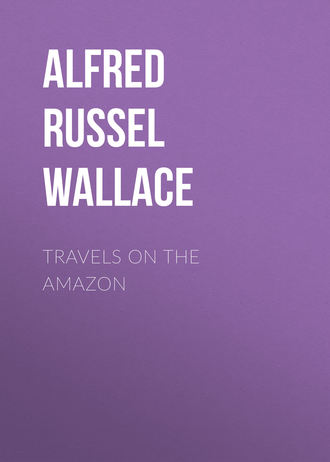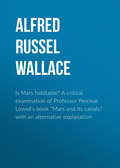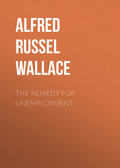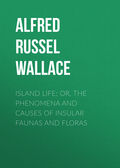
Alfred Russel Wallace
Travels on the Amazon
On the 10th we passed the "Tapioca," "Tucáno" (Toucan), "Tucunaré" (a fish), "Uaracú piními" (a fish), and "Tyeassú" (Pig) caxoeiras. The first was very bad, and both difficult and dangerous to pass; it consisted of many distinct falls among huge masses of rock. At one place the canoe remained stuck fast, amidst foaming waters, on the very edge of a fall, for nearly an hour; all the efforts of the Indians could not move it forward. They heaved it over from one side to the other, but with no effect; till I began to despair of getting out of the difficulty before night. At last the canoe suddenly moved on, with apparently not so much force as had been before applied to it; but my Indians, being of several nations, did not understand any common language, and it was impossible to get them to act in concert, or obey any leader. It was probably some chance combination of forces, that at last extricated us from our unpleasant situation. At this fall, on the rocks, were very numerous figures, or picture-writings, and I stopped to make drawings of them; of which I had by this time a rather extensive collection.
The next three falls were small rapids; but the last, which we reached late in the evening, was fearful. The river makes a sudden bend, and is confined in a very narrow channel, which is one confused mass of rocks of every size and shape, piled on one another, and heaped up in the greatest possible confusion. Every stone which rises above high-water mark is covered with vegetation; and among the whole the river rushes and foams, so as to make the task of pilot one of no ordinary difficulty. Just as it was getting dark, we passed out of these gloomy narrows into a wider and more cheerful part of the river, and stayed at a rock to sup and sleep.
On the 11th, early, we reached Uarucapurí, where are a village and several maloccas. The first which we entered was inhabited by people of the Cobeu nation. There were about a dozen handsome men, all clean-limbed and well painted, with armlets and necklaces of white beads, and with the ears plugged with a piece of wood the size of a common bottle-cork, to the end of which was glued a piece of porcelain presenting a white shining surface. We agreed with these men to help to pass our canoe up the falls, and then proceeded on our walk through the village. My old friend Senhor Chagas was here, and with him I breakfasted off a fine pirahíba which his men had caught that morning, and which was the first I had eaten since my illness.
With some difficulty I succeeded in buying two or three baskets of farinha; and being anxious to get to my journey's end, which was now near at hand, about midday we proceeded. Our pilot and his son left us, and we had now only six paddles; but four or five additional men came with us to pass the remaining caxoeiras, which were near. Close to the village we passed the "Cururú" (a toad), and "Murucututú" (an owl) falls, both rather bad; and, soon after, arrived at the "Uacoroúa" (Goatsucker), the last great fall on the river below the "Juruparí," which is many days further up. Here the river is precipitated over a nearly vertical rock, about ten feet high, and much broken in places. The canoe had to be entirely unloaded, and then pulled up over the rocks on the margin of the fall, a matter of considerable difficulty. To add to our discomfort, a shower of rain came on while the canoe was passing; and the Indians, as usual, having scattered the cargo about in great confusion, it had to be huddled together and covered with mats and palm-leaves, till the shower, which was luckily a short one, passed over. Loading again and proceeding onwards, we passed three small rapids, the "Tatu" (Armadillo), "Ocokí" (a fruit), and "Piranterá" (a fish) caxoeiras; and our additional Indians here left us, with their payment of fish-hooks and arrow-heads, as we now had only smooth water before us. In the afternoon we passed a malocca, where one of the Indians wished to land to see his friends; and as we did not stay, at night he took his departure, and we saw no more of him.
Early the next morning we reached Mucúra, where two young Brazilians, whom I had met with below, were residing, trading for salsa. I was now in the country of the painted turtle and the white umbrella-bird, and I determined to make a stay of at least a fortnight, to try and obtain these much-desired rarities.
Messrs. Nicoláu and Bellarmine were both out, and their little palm-leaf huts were evidently quite inadequate to my accommodation. The only other house was a small Indian malocca, also made entirely of "palha;" and I agreed with the owner to let me have half of it, giving him a small knife and mirror in payment, with which he was well contented. We accordingly cleared and swept out our part of the house, unloaded and arranged our things, and I then sent my guardas to a malocca, in which there were said to be plenty of Indians, to see if they had any farinha or pacovas to dispose of; and also to let them know that I would purchase birds, or fish, or any other animals they could obtain for me. The men were all out; but the same afternoon they came in great force to see the "Branco," and make an attack on my fish-hooks and beads, bringing me fish, pacovas, farinha, and mandiocca-cake, for all of which one of these two articles was asked in exchange.
I was now settled at the limit of my expedition, for I could not think of going a week further up only to see Juruparí caxoeira,—wasting the little time I had to rest, before again descending. We had made a favourable voyage, without any serious accident, up a river perhaps unsurpassed for the difficulties and dangers of its navigation. We had passed fifty caxoeiras, great and small; some mere rapids, others furious cataracts, and some nearly perpendicular falls. About twenty were rapids, up which, by the help of a long sipó attached to the canoe, instead of a rope, we were pulled without much difficulty. About eighteen were very bad and dangerous, requiring the canoe to be partially unloaded where practicable, and all the exertions of my Indians, often with additional assistance, to pass; and twelve were so high and furious as to require the canoe to be entirely unloaded, and either pulled over the dry and often very precipitous rocks, or with almost equal difficulty up the margin of the fall. At Carurú, as I have said, four-and-twenty men were scarcely able to pull my empty canoe over the rock, though plentifully strewn with branches and bushes, to smooth the asperities which would otherwise much damage the bottom: this was the reason why I purchased the Tushaúa's smaller obá, to proceed; and it was well I did, or I might otherwise have had to return without ever reaching the locality I had at length attained.
The next day, the 13th, I was employed drawing some new fish brought me the preceding evening. My hunters went out and brought me nothing but a common hawk. In the afternoon, the father and brother of the Indian I had found in the house, arrived, with their wives and families; so now, with my six Indians and two hunters, we were pretty full; some of them, however, slept in a shed, and we were as comfortably accommodated as could be expected. The wives of the father and two sons were perfectly naked, and were, moreover, apparently quite unconscious of the fact. The old woman possessed a "saía," or petticoat, which she sometimes put on, and seemed then almost as much ashamed of herself as civilised people would be if they took theirs off. So powerful is the effect of education and habit!
Having been told by Senhor Chagas that there was an excellent hunter in the Codiarí, a river which enters from the north a short distance above Mucúra, I sent Philippe, one of my guardas, to try and engage him, and also to buy all the living birds and animals he could meet with. The following day he returned, bringing with him one "Macaco barrigudo" (Lagothrix Humboldtii), and a couple of parrots. On most days I had a new fish or two to figure, but birds and insects were very scarce. This day Senhor Nicoláu returned. On my first arrival I had been told that he had a "tataruga pintata" (painted turtle) for me, but that he would give it me himself on his arrival; so I did not meddle with it, though my Indians saw it in a "corrál," in a small stream near the house. On arriving, he sent to fetch it, but found it had escaped, though it had been seen in its cage on the preceding day. I thus lost perhaps my only chance of obtaining a much-desired and probably undescribed river turtle, as the time of egg-laying was past, and they had now retired into the lakes, and become very scarce and difficult to be met with.
As my Indians were here doing nothing, I sent three of them with Sebastião up the Codiarí, with beads, hooks, mirrors, etc., to buy monkeys, parrots, or whatever else they could meet with, as well as some farinha, which I did not wish to be in want of again. I sent them with instructions to go for five or six days, in order to reach the last sitio, and purchase all that was to be had. In two days, however, they returned, having been no further than Philippe had gone, Sebastião saying that his companions would not go on. He brought me some parrots and small birds, bows, bird-skins, and more farinha than my canoe would carry, all purchased very dearly, judging by the remnant of articles brought back.
Being now in a part of the country that no European traveller had ever before visited, I exceedingly regretted my want of instruments to determine the latitude, longitude, and height above the sea. The two last I had no means whatever of ascertaining, having broken my boiling-point thermometer, and lost my smaller one, without having been able to replace either. I once thought of sealing up a flask of air, by accurately weighing which on my return, the density of air at that particular time would be obtained, and the height at which a barometer would have stood might be deduced. But, besides that this would only give a result equal to that of a single barometer observation, there were insuperable difficulties in the way of sealing up the bottle, for whether sealing-wax or pitch were used, or even should the bottle be hermetically sealed, heat must be applied, and at the moment of application would, of course, rarefy the air within the bottle, and so produce in such a delicate operation very erroneous results. My observations, however, on the heights of the falls we passed, would give their sum as about two hundred and fifty feet; now if we add fifty for the fall of the river between them, we shall obtain three hundred feet, as the probable height of the point I reached above the mouth of the river; and, as I have every reason to believe that that is not five hundred feet above the sea, we shall obtain eight hundred feet as the probable limit of the height of the river above the sea-level, at the point I reached. Nothing, however, can accurately determine this fact, but a series of barometer or "boiling-point" observations; and to determine this height above the next great fall, and ascertain the true course and sources of this little-known but interesting and important river, would be an object worth the danger and expense of the voyage.
There is said to be a week's smooth water above this place, to the Juruparí caxoeira, which is higher than any below it; and above this no other fall has been found, though traders have been ten or fifteen days up. They say the river still keeps as wide or wider than below,—that the water is as "white," or muddy, as that of the Solimões,—that many trees, birds, and fish peculiar to the Solimões are there found,—that the Indians have Spanish knives, ponchos, and coins,—and relate that, higher up, there are extensive "campos," with cattle, and men on horseback. All these interesting particulars seem to show that the river has its sources in the great plains which extend to the base of the Andes, somewhere near where the sources of the Guaviare are placed in most maps; but the latter river, from all the information I can obtain, is much smaller, and has a much shorter course. Having only a pocket surveying sextant, without any means of viewing two objects much differing in brilliancy, I endeavoured to obtain the latitude as accurately as I could, first by means of the zenith-distance at noon, obtained by a plumb-line and image of the sun, formed by a lens of about fifteen inches focus; and afterwards, by the meridian altitude of a star, obtained on a calm night, by reflection in a cuya of water. I took much care to ensure an accurate result, and have every reason to believe that the mean of the two observations will not be more than two or three minutes from the truth.
My expectations of finding rare and handsome birds here were quite disappointed. My hunter and Senhor Nicoláu killed a few umbrella-birds of the Rio Negro species; but of the white bird such contradictory statements were given,—many knowing nothing whatever about it, others saying that it was sometimes, but very rarely seen,—that I am inclined to think it is a mere white variety, such as occurs at times with our blackbirds and starlings at home, and as are sometimes found among the curassow-birds and agoutis. Another bird, which I had been long searching for, the "anambé de catinga," a species of Cyanurus, was here shot; and before leaving, I obtained four or five specimens of it, and as many of the commoner black-headed species. One or two small birds, new to me, were also obtained; and these, with two or three scarce butterflies, and about a dozen new species of fish, composed my natural-history collections in this remote and unvisited district. This was entirely owing, however, to my unfortunate and unforeseen illness, for birds in great variety had been very abundant, but the time of the fruit was now over; fish and turtles, too, were in extraordinary plenty at the commencement of the fall of the river, two months back; and during that period, constituting the short summer in these districts, while I lay half dead at São Joaquim, insects were doubtless more numerous.
But as there was now no remedy I made myself as contented as I could, and endeavoured at least to complete my collection of the arms, implements, and ornaments of the natives. The Indians here were mostly "Cobeus," and I obtained several of their peculiar ornaments and dresses, to add to my collection. I also took advantage of the visit of a Tushaúa, or chief, who well understood the Lingoa Geral, to obtain a vocabulary of their language.
Just as I was about to leave on my voyage down, I received a note from Senhor Chagas, requesting, in the name of Tenente Jesuino, the loan of my canoe, to ascend higher up the river; which, as the time of his stay was very uncertain, I was obliged to refuse. This Tenente, an ignorant half-breed, was sent by the new Barra government to bring all the Tushaúas, or chiefs, of the Uaupés and Isanna rivers to Barra, to receive diplomas and presents. An Indian, sent by him, had arrived at Carurú caxoeira, and wished to buy the obá of the Tushaúa, after I had paid for and got possession of it, and even had the impudence to request me to give it back again, in order that he might purchase or borrow it; and my refusal was, of course, quite sufficient seriously to offend the said Tenente.
On the 25th, having been just a fortnight at Mucúra, I left, much disappointed with regard to the collections I had made there. The same day I reached Uarucapurí, whence I could not proceed without a pilot, as the falls below are very dangerous. There was hardly a male in the village, Messrs. Jesuino and Chagas having taken all with them up the river, to assist in an attack on an Indian tribe, the "Carapanás," where they hoped to get a lot of women, boys, and children, to take as presents to Barra. There was scarcely anything to be had to eat: fish were not to be caught, though we sent our Indians out every day; and though fowls were abundant, their owners were out, and those in charge of them would not sell them. At length, after four days, I succeeded in persuading the son of the Tushaúa to go with me as pilot to Jauarité, he not being able to resist the knives, beads, and mirror, which I spread out before him.
I had collected scarcely anything in this place, but a single specimen of the beautiful and rare topaz-throated hummer (Trochilus pyra) and a new butterfly of the genus Callithea. I heard of the handsome bronze Jacana being found here, but my hunters searched for it in vain.
On the morning after we left, we saw a fine deer on a sandbank near us, so I sent Manoel into the forest to get behind it, while we remained quietly watching from the canoe. After walking about the beach a short time, it took to the water to cross the river, when we followed in pursuit; and, notwithstanding its turnings and doublings, soon came up,—when the poor animal was despatched by a blow on the head, and pulled into the canoe. The Indians then went briskly on, rejoicing in the certainty of a dinner for the next day or two, in which I heartily joined them. At Tapioca caxoeira we stayed two hours, to cook and salt the deer, and descended the fall without any accident.
On April 1st we passed a host of falls, shooting most of them amidst fearful waves and roaring breakers, and arrived safely at Carurú, where the Tushaúa gave us his house; for, having two canoes, we were obliged to wait to get more Indians. I was still too weak to go out into the forest; and, besides, had my live stock to attend to, which now consisted of four monkeys, about a dozen parrots, and six or eight small birds. It was a constant trouble to get food for them in sufficient variety, and to prevent them from escaping. Most of the birds are brought up without being confined, and if placed in a cage, attempt constantly to get out, and refuse food till they die; if, on the other hand, they are loose, they wander about to the Indians' houses, or into the forest, and are often lost. I here had two new toldas made to my canoes, but all attempts to hire men were fruitless. Fowls and fish were tolerably abundant, so we were better off than at Uarucapurí.
On the 4th, in the afternoon, Senhors Jesuino and Chagas arrived with a whole fleet of canoes, and upwards of twenty prisoners, all, but one, women and children. Seven men and one woman had been killed; the rest of the men escaped; but only one of the attacking party was killed. The man was kept bound, and the women and children well guarded, and every morning and evening they were all taken down to the river to bathe. At night there was abundance of caxirí and caxaça drunk in honour of the new-comers, and all the inhabitants assembled in the great house. I spoke to Jesuino about obtaining some Indians for me, which he promised to do. Next morning, however, his first act was to summon my pilot, and scold him for coming with me at all,—frightening the poor fellow so, that he immediately went off with his father down the river. Before he had left, however, having been told by my guardas what was going on, I applied to Jesuino about the matter, when he denied having said anything to the pilot, but refused to call him back, or make him fulfil his engagement with me. Soon after Jesuino left, having first sent five Indians to take me to Jauarité; so I started immediately after him. The men, however, had had instructions to go with me only a short distance, and then leave me where I could not procure any more; and about noon, much to my surprise, they got into a little obá, and intimated their intention to return, saying that they had only been told to come so far. I had overtaken Jesuino at this place, and now appealed to him; but though the men would have immediately obeyed an order from him he refused to give it, telling me that he had put them in my canoe, and now I must arrange with them as well as I could. I accordingly told the Indians, that if they came on with me to Jauarité, I would pay them well, but that, if they left me at this place, they should not have a single fish-hook; but they knew very well what Senhor Jesuino wanted, so without another word they paddled off, leaving me to get on as I could. I had now only one man and one boy in each canoe, to pass rapids which required six or eight good paddles to shoot with safety; but staying here was useless, so we went on,—drifting down the stream after Senhor Jesuino, who, no doubt, rejoiced in the idea that I should probably lose my canoes, if not my life, in the caxoeiras, and thought himself well revenged on the stranger who had dared to buy the canoe he had wanted to purchase.
In the afternoon we passed a caxoeira with considerable danger, and then, luckily, persuaded some Indians at a sitio to come with us to Jauarité. In the afternoon I stayed at several houses, purchasing fowls, parrots, bows and arrows and feathers; and at one of them I found my runaway pilot, and made him give me two baskets of farinha, instead of the payment he had received for the voyage from Carurú to Jauarité. At the last caxoeira, close to Jauarité, we were very near losing our canoe, which was let down by a rope, I remaining in it; but just in passing, it got twisted broadside, and the water rushing up from the bottom, had the curious effect of pushing it up against the fall, where it remained a considerable time completely on one side, and appearing as if every minute it would turn over. However, at last it was got out, and we reached the village, much to the surprise of Senhor Jesuino, who had arrived there but a few hours before us. My friend Senhor Augustinho, of São Jeronymo, was also there, and I spent the evening pleasantly with them.
I found that we differed in our calculations of the date, there being a day's difference in our reckonings of the day of the week and the day of the month. As I had been three months up the river, it was to be supposed I was wrong; yet as I had kept a regular diary all the voyage, I could not at all make out how I had erred. This, however, is a common thing in these remote districts. When two parties meet, one going up and the other coming down the river, the first inquiry of the latter, after the usual compliments, is, "What day is it with you?" and it not unfrequently happens, that there are three parties present, all of whom make it different days; and then there is a comparison of authorities, and a determination of past Saints' days, in order to settle the correction of the disputed calendar. When at Caturú caxoeira, we had found that Messrs. Jesuino and Chagas differed from us on this important particular; but as they had been some time out, we thought they might have erred as well as ourselves. Now, however, that Senhor Augustinho, who had recently come from São Gabriel, whence he had brought the correct date, agreed with them, there was no withstanding such authority. A minute examination of my diary was made, and it was then found that on our first stay at Carurú we had reckoned our delay there as five days instead of six. The Indians generally keep accounts of the time very accurately on a voyage, by cutting notches on a stick, as boys do at school on the approach of the holidays. In our case, however, even they were most of them wrong, for some of them agreed with me, while others made a day in advance, and others again a day behind us, so that we got completely confused. Sometimes the traders residing at the Indian villages pass many months, without seeing a person from any civilised part, and get two or three days out in their reckonings. Even in more populous places, where all the inhabitants depend on the priest or the commandante, errors have been made, and Sundays and Saints' days have been desecrated, while Mondays and common days have been observed in their place, much to the horror of all good Catholics.
The next morning I took a turn round the village,—bought some paroquets and parrots, and some feather ornaments and small pots, of the Tushaúa; and then, having nothing to keep me at Jauarité, and having vainly endeavoured to get some Indians to go with me, I left for São Jeronymo. On arriving at the first great fall of Pinupinú, we found only one Indian, and were obliged to send to the village for more. That afternoon they did not choose to come, and we lost a beautiful day. The next morning, as was to be expected, commenced a soaking rain; but as the Indians arrived we went on, and about noon, the rain clearing off a little, we passed the fall of Panoré, and arrived safely at the village of São Jeronymo. Here we disembarked, and unloaded our canoes, taking possession of the doorless "casa da nação," and made up our minds to remain quietly till we should get men to go down the river.
The same afternoon Jesuino arrived, and the next morning left,—kindly inquiring when I intended to proceed, and saying, he had spoken with the Tushaúa to get me Indians. In two days, however, the Tushaúa also left for Barra, without giving me a single Indian, notwithstanding the promises and threats I had alternately employed.
The two Indians who had remained with me now left, and the two boys who had come from São Joaquim ran away, leaving me alone in my glory, with my two "guardas" and two canoes. In vain I showed my axes, knives, beads, mirrors, and cloth, to every passing Indian; not one could be induced to go with me, and I might probably have remained prisoner there for months, had not Senhor Victorino, the "Juiz de Paz," arrived, and also Bernado, my old pilot, who had left me at Jauarité, and had now been down to São Joaquim. Between them, after a delay of several more days, some Indians were persuaded to receive payment to go with me as far as Castanheiro, where I hoped to get Capitão Ricardo to order them on to Barra.







